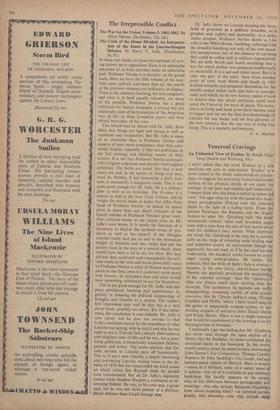The Irrepressible Conflict
The War for the Union, Volume I: 1861-1862. By Allan Nevins. (Scribners, 52s. 6d.) The Crisis of the House Divided: An Interpreta- tion of the Issues in the Lincoln-Douglas Debates. By Harry V. Jaffa. (Doubleday, $6.50.)
IN these two books we have two methods of writ- ing history set in opposition. Each is an admirable specimen of its kind and they make an admirable pair. Professor Nevins is a narrator on the grand scale. Here we have the fifth volume of his mag- num opus; and all, and more than all, the merits of the previous volumes are brilliantly on display. There is the immense learning, the firm judgment, and what is at least equally valuable, the sense of the possible. Professor Nevins has a great tolerance for human weakness, a critical but not unfriendly view of the limitations of 'the American way of life' in these formative years—and firm ethical principles of his own.
This ethical bias he shares with Dr. Jaffa. Both think that things are right and wrong as well as expedient and inexpedient. But Dr. Jaffa is more of an absolutist than is Professor Nevins and expects of men more consistency than they com- monly display, especially if they are politicians in the full enticing and blinding course of their careers. It is not that Professor Nevins automati- cally forgives a devious and morally short-sighted politician. The faults are noted. But that is how many are and, in the nature of things and men, must be. Politics, if not necessarily a dirty busi- ness, is necessarily a dangerous trade. This is not quite good enough for Dr. Jaffa. He is a philoso- pher as well as an historian. The Gorgias is a source as well aS the New York Tribune and he weighs the moral issues in scales that differ from those of Professor Nevins—as indeed he makes plain in more than one direct criticism of the fourth volume of Professor Nevins's great work. One criticism seems to me unjust even on Dr. Jaffa's own terms. It is surely the function of a statesman to display the cardinal virtue of pru- dence as well as the others? If the Douglas schemes really had put an end to the immediate danger of disunion and war, really had put the slavery issue in the way of a natural death, there would have been a lot to say for them. But they did not, they could not; and consequently the criti- cism made at the time and made powerfully since by Professor Nevins is valid. If Munich had meant peace in our time, even if it could not mean peace with honour, its defenders then and since would have something substantial to say for themselves.
This is not good enough for Dr. Jaffa, who dis- plays prodigious learning and superhuman in- genuity in reducing the political outpourings of Douglas and Lincoln to a system. The reader's first impression may well be that this is a very clever book, possibly too clever. put if one perse- veres, the conclusion is unavoidable. Dr. Jaffa is very clever, but he does not overdo it—that is the conclusion forced by the exposition of what Lincoln was saying, why he said it and why he was right to say it. Lincoln had a deeply philosophical and religious view of life and he was, for a prac- tising politician, a remarkably consistent thinker, speaker and writer. The acute analysis that Dr. Jaffa devotes to Lincoln pays off handsomely. This is, if not a new Lincoln, a deeply interesting and convincing Lincoln, raising issues in the de- bates of 1858 that far transcended the local issues on which critics like Randall think he should have concentrated. But all Dr. Jaffa's ingenuity cannot make Stephen Douglas a consistent or in- teresting thinker. He was, in his own way, a great man, but he was not more patient of a philoso- phical defence than Lloyd George was.
Dr. Jaffa shows us Lincoln crossing the thres- hold of greatness as a political preacher, as a prophet and, rightly and necessarily, as a pessi- mistic prophet. Professor Nevins shows us Lin- coln in the White House, fumbling, suffering from the dreadful handicap not only of his own execu- tive inexperience, but of the absence of anything that could be called civil or military organisation. We see both North and South stumbling into a war for which neither was prepared intellectually or materially. It is a sad and comic story. But it is only one part of the story. Seen from another point of view, both North and South in 1861 worked miracles and prepared themselves for the terrible ordeal which each side bore so courage- ously and which, by its very horror, makes it hard to believe that any adroit politician could have saved the Union by the ways of peace. The narra- tive is as lively and lucid as we have become used to expect and we see the first foreshadowings of Lincoln the war leader and the first glimpses of the new America that the war was to bring into being. This is a masterly performance.






































































 Previous page
Previous page